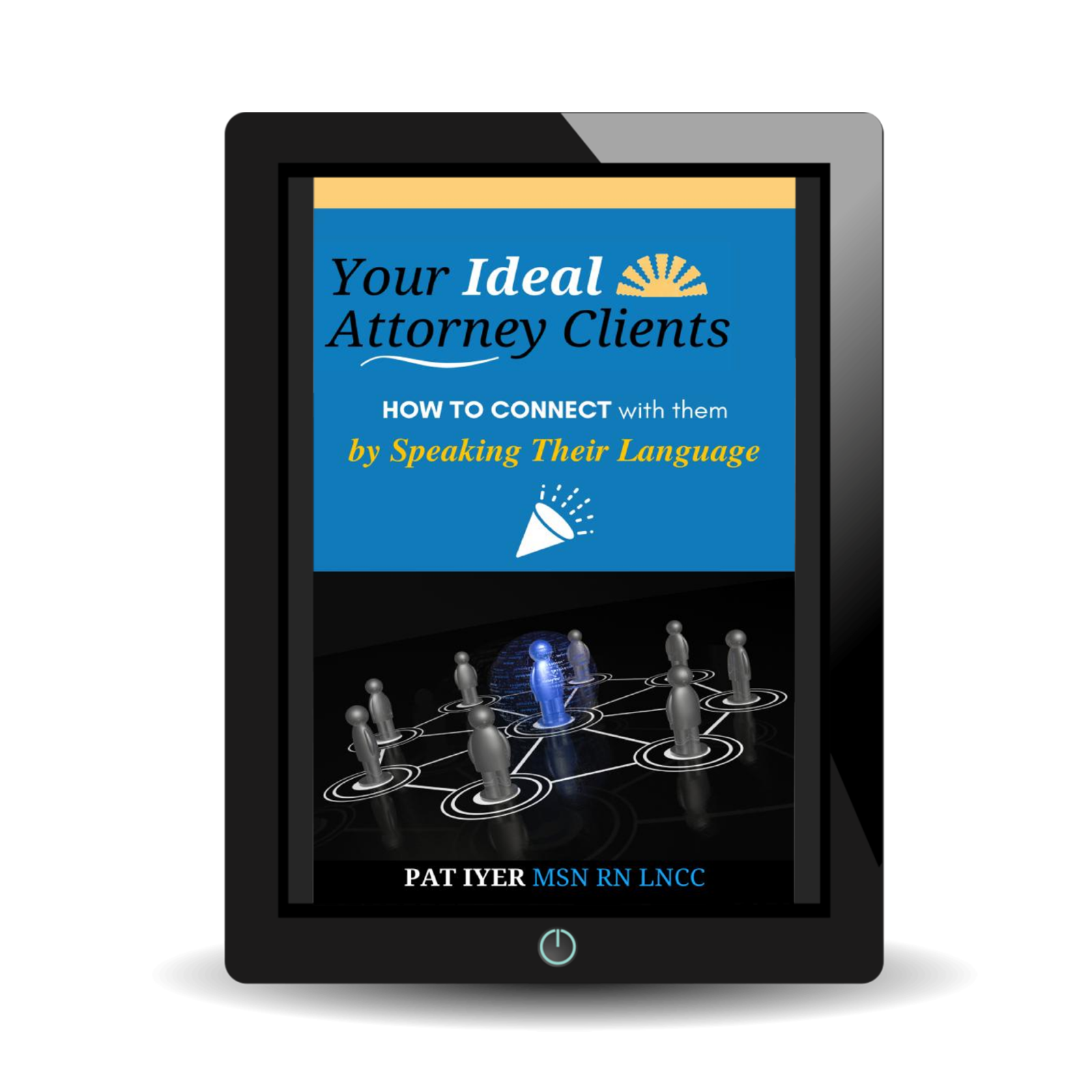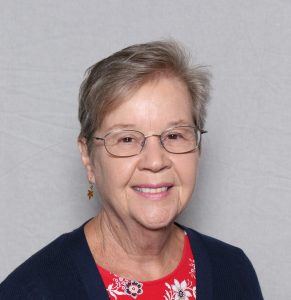LNC Prospecting for Presentations: Find Your Ideal Attorney Clients

LNC prospecting to find your ideal attorney clients is a vital piece of building a successful LNC business. In this post, I will share a powerful way to do this using powerful presentations.
Are You Memorable?
- How do you stand out in a crowded field of legal nurse consultants?
- How do you show attorneys that your knowledge will make a difference in their cases?
- And, can you comfortably convey your experience so that you impress your audience?
You know you can help attorneys and that they don’t understand all the nuances of the medical world like you do. You have the knowledge they need. How do you bridge the gap?
Giving presentations to attorneys is one answer. Instead of knocking on doors, making cold calls, and sending out letters, you draw attorneys to you. Educating attorneys allows you to share your knowledge, gain clients, and make their lives easier.
You are the LNC they remember when they have a case; you are the helpful consultant who will make it easier for them to screen cases, go through medical details, and understand the medical world.
Your experiences as a nurse give you the foundation for helping attorneys prepare for depositions, talk to experts, and understand the injuries.
Attorneys don’t want to miss details, be surprised by something their adversary knows, or fall into traps. You are there to guide them.
But only if they know who you are.
When you give a presentation, whether informal or formal, you establish credibility, visibility, and usefulness. How well you present will affect your ability to serve your current and future clients.
What you learn in my book (Powerful LNC Presentations: How to Get the Case) will help you stand out as skilled in giving both educational and sales presentations. Order here.
- Giving a one-on-one presentation to a client
- Presenting at a group meeting of the firm’s staff
- Providing a webinar or speaking at a conference, or
- Selling your services to a prospect
Who am I?
In 1987, a conference on career alternatives for nurses changed my life. I found it intriguing when the presenter described the expert witness’s role. Within a few months, after marketing to attorneys, I started receiving calls to review medical-surgical cases. My first trial took place only two months later.
I testified as an expert witness for the next 25 years.
As my reputation as a knowledgeable LNC grew, my attorney clients began inviting me to be part of panels of speakers at attorney conferences. I spoke in front of attorneys and paralegals at local and national conferences on topics such as medical records, nursing home liability, the role of the expert, and damages. These opportunities led to more cases.
One ten-minute presentation ultimately resulted in $250,000 worth of cases. I share more about that event in this book, Your Ideal Attorney Clients: How to Connect with Them by Speaking Their Language.
After building my independent LNC business for 28 years, I sold it in 2015 and then returned to working with attorneys in 2021. I consult behind the scenes and summarize records as an expert fact witness. In addition, I mentor LNCs.
LNC Prospecting for Presentations
The principles in my book, Powerful LNC Presentations: How to Get the Case, apply to several types of presentations. The first part of this book focuses on educational presentations.
One on One
You might have a one-on-one call or meeting with a client to discuss a specific case.
In that meeting, you could be:
- Explaining your analysis of the case
- Teaching the attorney about a particular aspect of medical practice
- Helping the attorney strategize how to handle the case
- Elaborating on your written report
- Discussing demonstrative evidence
- Assisting the attorney prepare questions and strategies for a deposition
- Many other types of support
Our nursing training as patient educators comes in handy. We know how to organize our thoughts, evaluate what the patient already knows about the topic, pick a method of explanation that the patient can follow, and evaluate the patient’s understanding of what we taught.
Substitute attorney for patient, and you see how your experience as a nurse applies directly to making an educational presentation to an attorney.
Team Meeting
When the attorney involves others, such as other attorneys or paralegals, you may be invited to participate in the same discussions by serving as the medical consultant in the room (whether in person or virtually).
As you work on cases with your clients, one-on-one and team meeting presentations occur organically. You may have minutes to days to prepare for these.
Lunch and Learn
A lunch and learn is a specific presentation designed to share your knowledge. Some lunch and learns are the firm’s first exposure to you. In other cases, one of your clients at the firm may suggest this event to expand their colleague’s knowledge of the topic and your services.
Typically, you present content to demonstrate your knowledge of a topic. The in-person setting would include you or the law firm providing food to the attendees. This presentation may occur in a digital online environment as well. You may have 30-60 minutes for your presentation, including questions, comments, and answers. This presentation is usually not billable or compensated time because it is a marketing opportunity encased in education.
Be sure to bring business cards and other literature to hand to attorneys or display your contact information if you present digitally.
Webinar/digital online
You might be the sole presenter or share the screen with other speakers during a webinar. These programs are often organized by national webinar companies, bar associations, or trial lawyers’ groups. Zoom and GotoWebinar are the most commonly used platforms. You will present your content through a panel discussion, interview, or slides.
If you are new to preparing slides, seek a thorough education on slide preparation. Be sure to avoid preparing slides with tons of words. There should be no paragraphs or sentences. Put no more than a few words on a single slide. Loading up your slides with words will tempt your audience to read the slide instead of listening to you.
In-person or Online Conference
A conference may take place online or in person. They are typically half-day to three- or four-day events filled with various speakers. In the states that require mandatory continuing legal education credits, there are often several educational events throughout the year.
The common theme in these presentations is that they are educational and designed to highlight your expertise. As such, they serve to bring you new business.
 Order it here.
Order it here.
Seeking Invitations to Speak
Presentations to attorneys happen organically as you work on cases and participate in one-on-one consultations and team meetings. In contrast, you might seek opportunities to make an educational presentation at a lunch and learn, webinar, or conference.
Who to ask to invite you to speak
The first person who needs to be convinced is you. Yes, consider what is involved for you to take this step.
- You are the center of attention. You may not like this. That’s a problem we’ll address here.
- You must speak well.
- You must represent yourself as knowledgeable.
- You must be able to answer questions quickly and easily by thinking on your feet.
- You must appear calm and self-assured.
- You are advertising yourself.
Public speaking, wherever it occurs, is traumatic for countless people. Often, they were forced in school to get up in front of bored and possibly mean fellow students and stumble through a speech or report without any preparation in the art of speaking.
The good news is that many have overcome their traumas to become notable speakers. So can you. Presenting to attorneys and sharing your knowledge is one of the surest ways to draw attorneys to you.
Consider taking a seminar on speaking or getting coaching from a group like Toastmasters. Practice giving speeches or talks in relaxed environments before small groups. Don’t risk a setting that might be critical to your career until you feel confident.
Introverts-I’m one-can bring unique observation talents to the role of LNC, but they don’t love being scrutinized. This situation can create a challenging feeling of self-consciousness and vulnerability. With practice, with risk taking, with self-confidence, you will succeed.
 Order your instant digital download here.
Order your instant digital download here.

Pat Iyer is president of The Pat Iyer Group, which develops resources to assist LNCs in obtaining more clients, making more money, and achieving their business goals and dreams.
Pat’s related websites include the continuing education provided on LNCEU.com, the podcasts broadcast at podcast.legalnursebusiness.com, and writing tips supplied at patiyer.com.
Get all of Pat’s content in one place by downloading the mobile app, Expert Edu at www.legalnursebusiness.com/expertedu. Watch videos, listen to podcasts, read blogs, watch online courses and training, and more.

